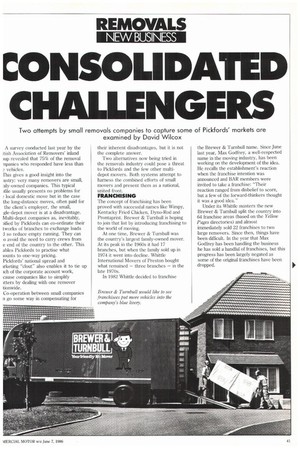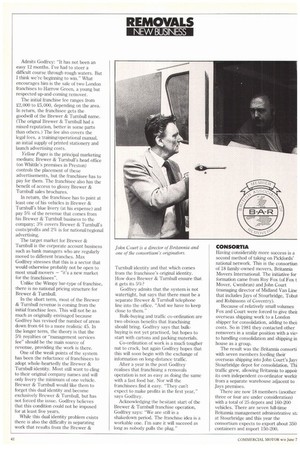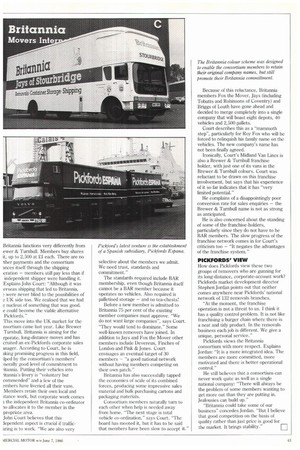CONSOLIDATED CHALLENGERS
Page 41

Page 42

Page 43

If you've noticed an error in this article please click here to report it so we can fix it.
Two attempts by small removals companies to capture some of Pickfords' markets are examined by David Wilcox
A survey conducted last year by the itish Association of Removers' inland iup revealed that 75% of the removal npanies who responded have less than vehicles.
this gives a good insight into the ,ustry: very many removers are small, ally-owned companies. This typical file usually presents no problems for local domestic move but in the case the long-distance moves, often paid for the client's employer, the small, gle-depot mover is at a disadvantage. Multi-depot companies as, inevitably, Afied by Pickfords can co-ordinate their tworks of branches to exchange loads d so reduce empty running. They can o avoid the need to carry crews from e end of the country to the other. This ables Pickfords to practise what iounts to one-way pricing.
Pickfords' national spread and irketing "clout" also enables it to tie up ich of the corporate account work, cause companies like to simplify itters by dealing with one remover tionwide.
Co-operation between small companies n go some way in compensating for their inherent disadvantages, but it is not the complete answer.
Two alternatives now being tried in the removals industry could pose a threat to Pickfords and the few other multidepot movers. Both systems attempt to harness the combined efforts of small movers and present them as a national, united front.
FRANCHISING The concept of franchising has been proved with successful names like Wimpy, Kentucky Fried Chicken, Dyno-Rod and Prontaprint. Brewer & Turnbull is hoping to join that list by introducing franchising to the world of moving.
At one time, Brewer & Turnbull was the country's largest family-owned mover. At its peak in the 1960s it had 17 branches, but when the family sold up in 1974 it went into decline. Whittle International Movers of Preston bought what remained — three branches — in the late 1970s.
In 1982 Whittle decided to franchise the Brewer & Turnbull name. Since June last year, Max Godfrey, a well-respected name in the moving industry, has been working on the development of the idea. He recalls the establishment's reaction when the franchise intention was announced and BAR members were invited to take a franchise: "Their reaction ranged from disbelief to scorn, but a few of the forward-thinkers thought it was a good idea."
Under its Whittle masters the new Brewer & Turnbull split the country into 64 franchise areas (based on the Yellow Pages directories) and almost immediately sold 22 franchises to two large removers. Since then, things have been difficult. In the year that Max Godfrey has been handling the business he has sold a handful of franchises, but this progress has been largely negated as some of the original franchises have been dropped. Admits Godfrey: "It has not been an easy 12 months. I've had to steer a difficult course through rough waters. But I think we're beginning to win." What encourages him is the sale of two London franchises to Harrow Green, a young but respected up-and-coming remover.
The initial franchise fee ranges from £2,000 to £5,000, depending on the area. In return, the franchisee gets the goodwill of the Brewer & Turnbull name. (The orignal Brewer & Turnbull had a mixed reputation, better in some parts than others.) The fee also covers the legal fees, a training/operational manual, an initial supply of printed stationery and launch advertising costs.
Yellow Pages is the principal marketing medium; Brewer & Turnbull's head office (on Whittle's premises in Preston) controls the placement of these advertisements, but the franchisee has to pay for them. The franchisee also has the benefit of access to glossy Brewer & Turnbull sales brochures.
In return, the franchisee has to paint at least one of his vehicles in Brewer & Turnbull's blue livery (at his expense) and pay 5% of the revenue that comes from his Brewer & Turnbull business to the company; 3% covers Brewer & Turnbull's costs/profits and 2% is for national/regional advertising.
The target market for Brewer & Turnbull is the corporate account business such as bank managers who are regularly moved to different branches. Max Godfrey stresses that this is a sector that would otherwise probably not be open to most small movers — "it's a new market for the franchisees".
Unlike the Wimpy bar-type of franchise, there is no national pricing structure for Brewer & Turnbull.
In the short term, most of the Brewer & Turnbull revenue is corning from the initial franchise fees. This will not be as much as originally envisaged because Godfrey has revised the number of areas down from 64 to a more realistic 45. In the longer term, the theory is that the 5% royalties or "management services fee" should be the main source of revenue, providing the work is there.
One of the weak points of the system has been the reluctance of franchisees to adopt whole-heartedly the Brewer & Turnbull identity. Most still want to cling to their original company names and will only livery the minimum of one vehicle. Brewer & Turnbull would like them to forget this dual identity and become exclusively Brewer & Turnbull, but has not forced the issue. Godfrey believes that this condition could not be imposed for at least five years.
While this dual identity problem exists there is also the difficulty in separating work that results from the Brewer & Turnbull identity and that which comes from the franchisee's original identity. How does Brewer & Turnbull ensure that it gets its 5%?
Godfrey admits that the system is not watertight, but says that there must be a separate Brewer & Turnbull telephone line into the office. "And we have to keep close to them."
Bulk-buying and traffic co-ordination are two obvious benefits that franchising should bring. Godfrey says that bulkbuying is not yet practised, but hopes to start with cartons and packing materials_ Co-ordination of work is a much tougher nut to crack, but again Godfrey hopes that this will soon begin with the exchange of information on long-distance traffic.
After a year in the post Godfrey realises that franchising a removals operation is not as easy as doing the same with a fast food bar. Nor will the franchisees find it easy. "They can't expect to make profits in the first year," says Godfrey.
Acknowledging the hesitant start of the Brewer & Turnbull franchise operation, Godfrey says: "We are still in a shakedown period. The franchise idea is a workable one. I'm sure it will succeed as long as nobody pulls the plug." CONSORTIA Having considerably more success is a second method of taking on Pickfords' national network. This is the consortiun of 18 family-owned movers, Britannia Movers International. The initiative for formation came from Roy Fox (of Fox t Mover, Cwmbran) and John Court (managing director of Midland Van Line that includes Jays of Stourbridge, Tobui and Robinsons of Coventry).
Because of relatively small volumes Fox and Court were forced to give their overseas shipping work to a London shipper for consolidation, adding to the costs. So in 1981 they contacted other removers in a similar position with a vie' to handling consolidation and shipping in house as a group.
The result was the Britannia consorti with seven members feeding their overseas shipping into John Court's Jays Stourbridge depot for consolidation. Thi traffic grew, allowing Britannia to appoir its own independent co-ordinator worlcir from a separate warehouse adjacent to Jays premises.
There are now 18 members (another three or four are under consideration) with a total of 25 depots and 160-200 vehicles. There are seven full-time Britannia management administrative sti at Stourbridge and this year the consortium expects to export about 350 containers and import 150-200. Britannia functions very differently from ewer & Turnbull. Members buy shares it, up to 2,500 at .C1 each. There are no ther payments and the consortium ances itself through the shipping eration — members still pay less than if independent shipper were handling it. Explains John Court: "Although it was erseas shipping that led to Britannia, were never blind to the possibilities of e UK side too. We realised that we had e nucleus of something that was good. e could become the viable alternative Pickfords."
This move into the UK market for the nsortium came last year. Like Brewer Turnbull, Britannia is aiming for the rporate, long-distance moves and has cruited an ex-Pickfords corporate sales anager. According to Court, he is aking promising progress in this field, :lped by the consortium's members' :nerally good level of commitment to -itannia. Putting their vehicles into -itannia's livery is "voluntary but commended" and a few of the embers have livened all their vans. Members retain their own local and stance work, but corporate work comes a the independent Britannia co-ordinator ho allocates it to the member in the propriate area.
John Court believes that this iependent aspect is crucial if trafficaring is to work. "We are also very selective about the members we admit. We need trust, standards and commitment."
The standards required include BAR membership, even though Britannia itself cannot be a BAR member because it operates no vehicles. Also required is palletised storage — and no tea-chests!
Before a new member is admitted to Britannia 75 per cent of the existing member companies must approve. "We do not want large companies", says Court. "They would tend to dominate." Some well-known removers have joined. In addition to Jays and Fox the Mover other members include Uevereux, Finches of London and Pink & Jones. Court envisages an eventual target of 30 members — "a good national network without having members competing on their own patch."
Britannia has also successfully tapped the economies of scale of its combined forces, producing some impressive sales material and bulk purchasing cartons and packaging materials.
Consortium members naturally turn to each other when help is needed away from home. "The next stage is total vehicle co-ordination," says Court. "The board has mooted it, but it has to be said that members have been slow to accept it." Because of this reluctance, Britannia members Fox the Mover, Jays (including Tobutts and Robinsons of Coventry) and Briggs of Louth have gone ahead and decided to merge completely into a single company that will boast eight depots, 40 vehicles and 2,500 pallets.
Court describes this as a "mammoth step", particularly for Roy Fox who will be forced to relinquish his family name on the vehicles. The new company's name has not been finally agreed.
Ironically, Court's Midland Van Lines is also a Brewer & Turnbull franchise holder, with just one of its vans in the Brewer & Turnbull colours. Court was reluctant to be drawn on this franchise involvement, but says that his experience of it so far indicates that it has "very limited potential."
He complains of a disappointingly poor conversion rate for sales enquiries — the Brewer & Turnbull name is not as strong as anticipated.
He is also concerned about the standing of some of the franchise-holders, particularly since they do not have to be BAR members. The slow progress of the franchise network comes in for Court's criticism too — "It negates the advantages of the franchise system."
PICKFORDS' VIEW How does Pickfords view these two groups of removers who are gunning for its long-distance, corporate-account work? Pickfords market development director Stephen Jordan points out that neither comes anywhere near Pickfords' national network of 132 removals branches.
"At the moment, the franchise operation is not a threat to us. I think it has a quality control problem. It is not like franchising a burger chain where there is a neat and tidy product. In the removals business each job is different. We give a unique, personal service."
Pickfords views the Britannia consortium with more respect. Explains Jordan: "It is a more integrated idea. The members are more committed, more motivated and there is better operational control."
He still believes that a consortium can never work quite as well as a single national company: "There will always be the problem of some members wanting to get more out than they are putting in. Jealousies can build up."
"Britannia could take some of our business" concedes Jordan. "But I believe that good competition on the basis of quality rather than just price is good for the market. It brings stability."




























































